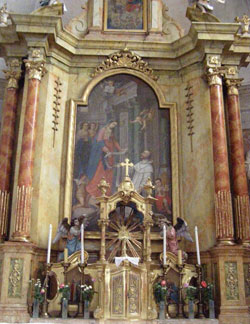
Feastday: April 17
Patron: of Saint Robert of Molesme
Death: 1134
Stephen Harding was born in Dorset, England. He was a speaker of English, Norman French, and Latin. He was placed in the abbey of Sherbourne at a young age, but eventually put aside the cowl and became a travelling scholar. He eventually moved to the abbey of Molesme in Burgundy, under the abbot Saint Robert of Molesme (c. 1027 - 1111).
When Robert left Molesme to avoid its corruption and laxity, Stephen and Saint Alberic went with him. Unlike Alberic, Stephen was not ordered to return, and he remained in solitude with Robert. When twenty-one monks deserted Molesme to join Robert, Harding, and Alberic, the three leaders formed a new monastery at Citeaux.
Robert was initially abbot at Citeaux, returning to Molesme after a year. Alberic then took over, serving as abbot until his death in 1108. Stephen Harding, the youngest of the three men, became the third abbot of Citeaux. As abbot, Stephen Harding guided the new monastery over a period of great growth. Bernard of Clairvaux came to visit in 1112 and brought with him his followers. Between 1112 and 1119, a dozen new Cistercian houses were founded to contain the monks coming to the new movement. In 1119, Stephen wrote the Carta Caritatis, ('Charter of Love') an important document for the Cistercian Order, establishing its unifying principles.
Stephen served the house at Citeaux for twenty-five years. While no single person is considered the founder of the Cistercian Order, the shape of Cistercian belief and its rapid growth in the 12th century was due to the leadership of Stephen Harding. In 1133, he resigned the head of the order, due to age and disability. He died the following year.
His feast day in the Roman Catholic calendar of saints is March 28. The north aisle of St Sepulchre-without-Newgate church in London, U.K. was formerly a chapel dedicated to him (it became the Musicians' Chapel in the 20th century).
In Hungary, in the village Apátistvánfalva there is a Catholic Baroque Church estd. by 1785, the patron saint of which is Stephen Harding. The village, and the vicinity Vendvidékwas at one time under Cistercian lordship.
For other people named Stephen Harding, see Stephen Harding (disambiguation).
Stephen Harding (French: Étienne Harding) (c. 1060 – 28 March 1134) was an English-born monk and abbot, who was one of the founders of the Cistercian Order. He is honored as a saint in the Roman Catholic Church.
Life
There is little archival evidence, yet all sources agree that Stephen was English and spent some time at the monastery of Sherborne as a young man. The main source about his youth, William of Malmesbury, states that Stephen then went to France and became friends with another Englishman, named Peter, The two made a pilgrimage to Rome, took new religious names and then went to Molesme Abbey upon returning to Burgundy, around 1085. In 1098, Stephen went to the "new monastery" (soon known as Cîteaux) together with Robert and Alberic, was elected abbot in 1108, and died in 1134.
 Bernard and Stephen
Bernard and Stephen
Stephen was the third abbot of Cîteaux. Under his administration, very few novices were joining the community and the monks were suffering from hunger and sickness. In 1112, Bernard of Clairvaux entered the community, bringing with him thirty companions.
Between 1112 and 1119, a dozen new Cistercian houses were founded to accommodate those joining the young order. Harding's organizational skills were exceptional; he instituted the system of general chapters and regular visitations. In 1119, he received official approbation for the Carta Caritatis (Charter of Charity), an important document for the Cistercian Order, establishing its unifying principles.
Stephen Harding served as abbot of Cîteaux for twenty-five years. While no single person is considered the founder of the Cistercian Order, the shape of Cistercian thought and its rapid growth in the 12th century were certainly due in some part to Harding's leadership. He was the abbot who accepted Bernard of Clairvaux. Insisting on simplicity in all aspects of monastic life, Stephen encouraged the severity of Cistercian architecture and the simple beauty of the Order's liturgy and music. He was an accomplished scribe; his highest achievement is considered to be the famous Harding Bible. In 1133, he resigned as abbot because of bad eyesight. He died on 28 March 1134.
Veneration for Stephen began in the Modern era. His feast was celebrated on 28 March until 1683 and then moved to 17 April, where it remained until the liturgical reforms following Vatican II. In a joint commemoration with Robert of Molesme and Alberic, the first two abbots of Cîteaux, the Roman Catholic Church today celebrates Stephen Harding's feast day on 26 January.

